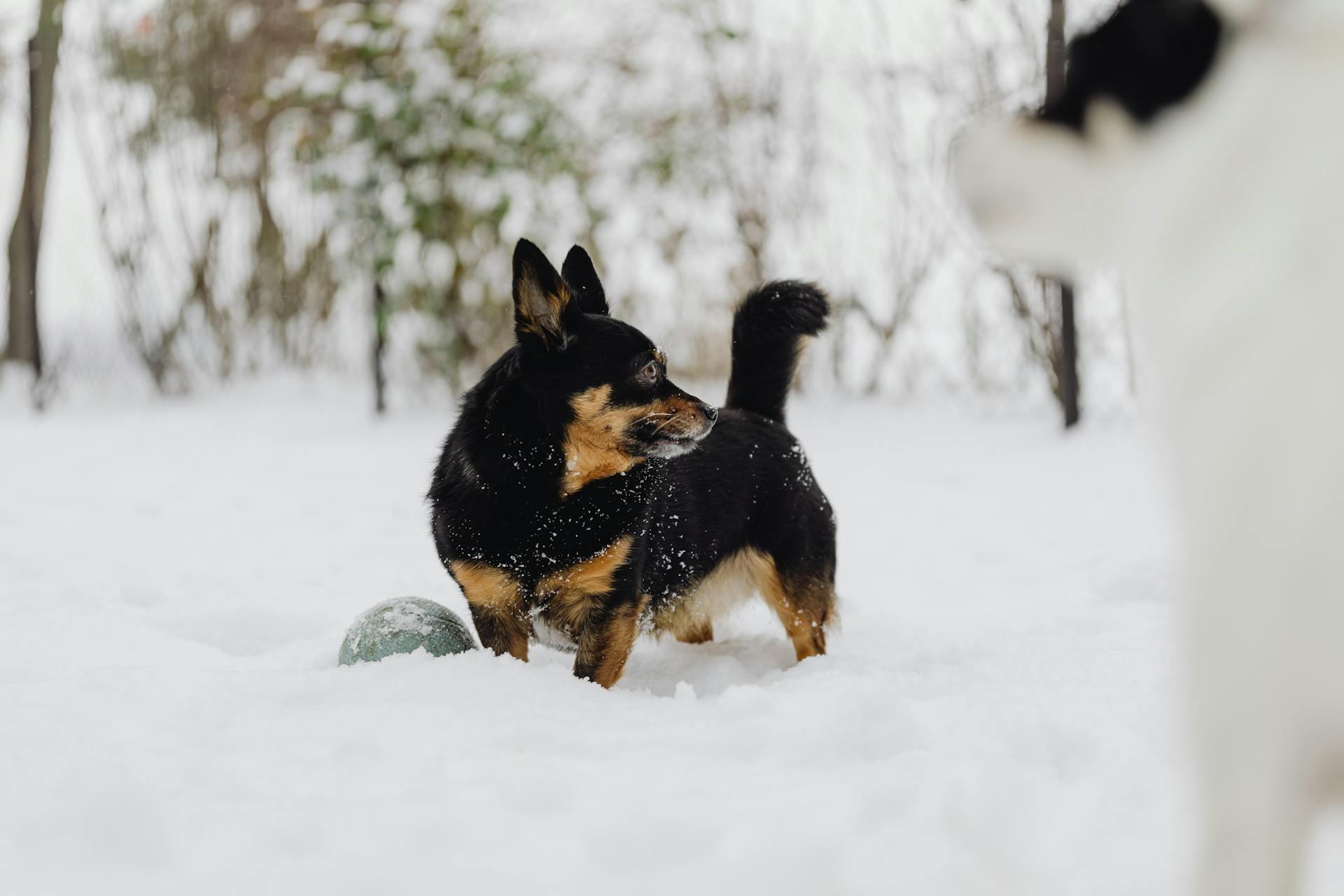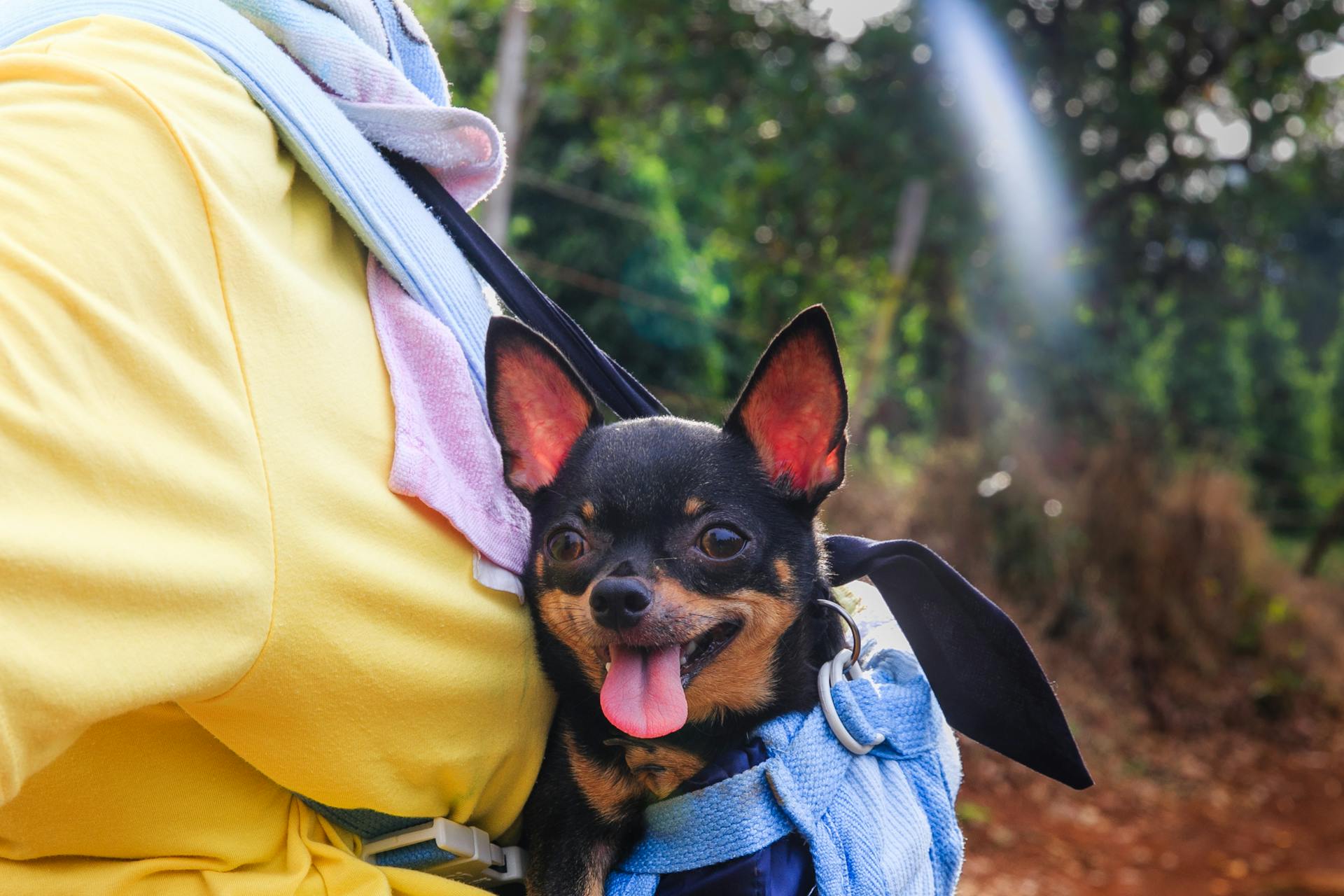
Raising a Pomeranian Teacup Chihuahua Mix requires patience, love, and understanding of their unique needs.
These small dogs need regular exercise to stay healthy and happy, but they can tire easily, so short play sessions are best.
Their small stomachs mean they need to eat high-quality, nutrient-rich food in small, frequent meals to prevent overeating and digestive issues.
With proper care and attention, your Pomeranian Teacup Chihuahua Mix can thrive and become a beloved companion.
Origin and History
The Pomeranian Teacup Chihuahua mix is a relatively new breed, with its standard approved by the Pomchi Club of America in 1998. This adorable mix resulted from a combination between the Chihuahua and the Pomeranian.
The Pomeranian Teacup Chihuahua mix is also known by other names, such as Pomachi, Chiranian, and Chiapom. Some people may refer to them by these names due to the mix's ancestry.
The Pomeranian breed descends from the Spitz, hailing from Eastern Europe. This heritage is a fascinating aspect of the Pomeranian's history.
Recommended read: Dog Names Female Pomeranian
The Chihuahua, on the other hand, originated in Mexico, possibly from Techichi lineage, and is named after the Mexican state of Chihuahua. This rich history adds to the allure of the Pomeranian Teacup Chihuahua mix.
The American Kennel Club (AKC) does not recognize the Pomeranian Teacup Chihuahua mix as a purebred dog. However, they have gained recognition from the Pomchi Club Of America, the American Canine Hybrid Club, and the Designer Canine Registry.
Check this out: American Eskimo Dog Pomeranian Mix
Appearance and Characteristics
Pomeranian Teacup Chihuahua Mixes can have a wide range of appearances due to their mixed breed nature.
Their height typically ranges from 6 to 9 inches, and their weight can vary from 4 to 12 pounds.
Their coats can be long or short, single or double, and come in a variety of colors such as black, sable, blue, chocolate, fawn, tan, and cream.
Some Pomchis may have a puffy appearance similar to their Pomeranian parents, while others may have a more compact body like their Chihuahua parents.
Their facial features can also vary, with some having big eyes and pointy ears, while others may have flatter faces and small dark eyes.
Their ears are usually medium-sized and triangular, standing erect, and may or may not have feathering.
Their eyes are round and usually dark-colored, but can also be almond-shaped or small.
In general, Pomchis can be compared to little foxes, with large and round eyes, upright ears, and a partly curled tail.
Most Pomchis are orange, but some may be cream or chocolate in color.
Their size and weight can vary depending on their lineage, with some being more like their Chihuahua parents and others more like their Pomeranian parents.
The Pomchi Club of America (PCA) established a breed standard in 1998, which describes the breed as a short-legged, small dog weighing anywhere from 4 to 12 pounds.
What Is a Mix's Temperament?
A Pomeranian teacup Chihuahua mix is a loving dog that makes a wonderful companion. They are typically loyal and affectionate, and they love being around their humans.
They can be prone to separation anxiety, so it's essential to provide them with plenty of attention and interaction throughout the day.
Pomchis are highly intelligent, but they can be stubborn, which might make training a bit challenging. Consistency and positive reinforcement are key to successful training.
They are also natural watchdogs, always listening and watching for potential threats. This can be both a blessing and a curse, as they might bark excessively at strangers or other animals.
Pomchis are generally good with children, but they can be wary of young kids who might not understand how to interact with them gently. Socialization is crucial to help them become confident and friendly dogs.
With proper training and socialization, a Pomeranian teacup Chihuahua mix can thrive in a variety of living situations, including apartments or homes with older children.
Pet Care
Grooming is a crucial part of pet care for Pomeranian Teacup Chihuahua mixes. Regular brushing is essential to prevent matting and tangling of their double coat.
You'll need to brush your Pomchi's coat at least once a week, but some owners find that doing it twice a week is better. This will help keep their coat looking healthy and prevent any painful matting.
Pomchis don't handle cold well, so giving them a haircut is not a good idea, especially if you live in a colder climate.
Their coats should be brushed daily to prevent matting and tangling, or, at the very least, several times a week, especially for long-haired coats.
You'll need to clean out your Pomchi's ears once a week because they're vulnerable to ear infections. Use a soft and damp cloth to clean their ears gently.
Trimming their nails is essential, and you'll need to do it when needed. You can trim their nails around once a month to every six weeks.
Brushing their teeth is also crucial to prevent dental problems. Brush their teeth twice a week, or ideally, daily, with canine toothpaste and a toothbrush.
Pomchis don't shed too often, but they will shed more during the fall and winter months. Brushing their coat will reduce the amount of hair that ends up around your house.
Bathing is only needed once a month, or less, unless they get dirty or smelly.
Health and Longevity
Pomeranian teacup Chihuahua mixes are generally a healthy breed, but like all breeds, they can be prone to certain health issues. Heart problems can be a concern, so regular check-ups with your vet are crucial.
It's essential to keep an eye out for signs of patellar luxation, a condition where the knee slides out of place. This can be painful for your dog and may require surgery.
Collapsing trachea is another potential issue, which can be caused by chronic coughing or other respiratory problems. If you notice your dog's breathing becoming labored or wheezy, seek veterinary attention right away.
Seizures can also affect Pomeranian teacup Chihuahua mixes, so it's vital to monitor your dog's behavior and watch for signs of seizure activity. If you notice any unusual behavior, such as staring or shaking, take your dog to the vet immediately.
Eye problems and hair loss are also possible health issues in this breed. Regular grooming and veterinary check-ups can help detect these problems early on.
You might enjoy: German Sheperd Mixes
To ensure your Pomeranian teacup Chihuahua mix lives a long and healthy life, make sure to provide regular exercise and a balanced diet. Aim for 12 to 16 years of companionship with your furry friend, assuming you take good care of them.
Here are some potential health issues to watch out for:
- Heart problems
- Patellar luxation (knee sliding out of place)
- Collapsing trachea
- Seizures
- Eye problems
- Hair loss
Training and Behavior
Training your Pomeranian Teacup Chihuahua mix requires patience and consistency, as they can be stubborn and require positive reinforcement.
Punishment doesn't work and may lead to defensive behavior, so use food rewards to your advantage. Consistency is key, and following through with rewards is essential.
Socialization is crucial, especially since they can be disinterested in or distrustful of strangers. Take your puppy to the dog park early on to get them used to other dogs and humans.
They're highly intelligent, but may balk under command simply because they think they're in charge. Implement a firm, but loving, regime to acquire optimum results.
Pomeranian Chihuahua mixes are vocal dogs and will bark to get your attention, so be prepared for excessive barking if not properly trained.
Do Bark?
Pomeranian Chihuahua mixes are vocal dogs and will bark to get your attention. They'll also bark at strangers, so be prepared for that.
They can be trained to reduce their barking, but they won't stop being vocal completely. This is something to keep in mind if you live in a building with noise restrictions.
You'll want to help them through training to minimize their barking at strangers. This will make life easier for both you and your pomchi.
Their barking can be a problem if you're out of the house often, especially if you live in a building with noise restrictions.
Training Your
Training Your Pomchi requires positive reinforcement, as they respond well to food rewards. Punishment can lead to defensive behavior.
Pomchis are very intelligent, so training procedures shouldn't be a problem. However, their cleverness can also make them stubborn, so consistency is key.
Socialization is crucial for Pomchis, especially since they can be disinterested in or distrustful of strangers. Taking them to the dog park early on can help them get used to other dogs and humans.
Pomchis are loving and friendly, but they may not be good with young children, who can come across as aggressive to them. This can result in barking, growling, or snapping.
To reduce barking, training is essential, but it's unlikely to completely stop. They'll still bark at strangers and to get attention.
Consistency and positive reinforcement are the best approaches to training a Pomchi. With patience and persistence, you can overcome their stubborn streak and develop a strong bond with your dog.
Choosing and Owning
Choosing a Pomeranian Teacup Chihuahua Mix requires careful consideration of their needs and lifestyle. These dogs can live for 12 to 16 years, making it a long-term commitment.
To determine if a Pomchi is right for you, consider factors like your living situation and schedule. They can thrive in apartments, but avoid noise-restricted areas due to their barking habits. They also need regular grooming and training, which can be time-consuming.
Here are some essential things to consider when owning a Pomeranian Teacup Chihuahua Mix:
- Weight: 4-12 pounds
- Height: 5-8 inches
- Lifespan: 12-16 years
- Grooming needs: Regular brushing and trimming of nails and teeth
- Temperament: Playful, affectionate, alert, and clever
- Energy level: Moderate to high
- Good with kids: May not be ideal for small children due to their small size and potential barking habits
- Good with other animals: May require socialization and careful introduction to other pets
Dogs
Choosing a dog breed can be overwhelming, but if you're looking for a companion that's perfect for apartment living, the Pomeranian Chihuahua mix, also known as the Pomchi, is a great option.
The Pomchi is a toy breed that typically weighs between 4-12 pounds and stands 5-8 inches tall, making it a great fit for small spaces.
They're known for being feisty and bold, but also affectionate and sweet to their owners, which makes them a great choice for first-time dog owners or singles.
Pomchis are generally low-maintenance when it comes to grooming, with a coat that can be a combination of smooth and long, or just smooth.
Here are some key characteristics of the Pomchi breed:
Pomchis are playful, affectionate, and alert, making them a great addition to any family, and they're also relatively easy to train with their clever nature.
Owning a Dog
Owning a dog is a big responsibility, but it can also be incredibly rewarding.
You'll need to consider your lifestyle and living situation before bringing a dog home. If you live in an apartment or have noise restrictions, a Pomchi might not be the best fit due to their barking habits.
You'll also want to think about the amount of time you have to care for a dog. Pomchis need at least an hour of playtime and grooming per day, so make sure you have the schedule to accommodate that.
A Pomchi is a relatively easy dog to care for, even for a first-time owner. They're not high-maintenance, but they do need regular grooming and check-ups with the vet.
In terms of other pets, Pomchis can get along with other dogs, but they might not be the best fit for multi-pet households. They can be a bit possessive and might not welcome other pets into their space.
You'll also want to consider the grooming needs of your Pomchi. If they have a long coat, they'll need regular brushing and trimming to prevent matting and tangling.
Overall, owning a dog can be a wonderful experience, but it's essential to do your research and make sure you're ready for the commitment.
Frequently Asked Questions
How big will a Pomeranian Chihuahua mix get?
A Pomchi typically reaches 6-7 inches in height and weighs between 6-12 pounds. This compact size makes them a great companion for city living or small homes.
How much does a Pomeranian Chihuahua mix cost?
The cost of a Pomchi puppy can range from $150 to $5,000 or more, depending on factors like breeding and bloodlines. Learn more about the factors that influence the price of a Pomchi puppy.
Is a pomchi a good dog?
Yes, a pomchi can make a great pet due to its playful, affectionate, and clever nature. With proper training, it can even excel as a watchdog, thanks to its tendency to bark at strangers.
Featured Images: pexels.com


